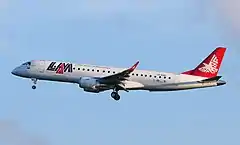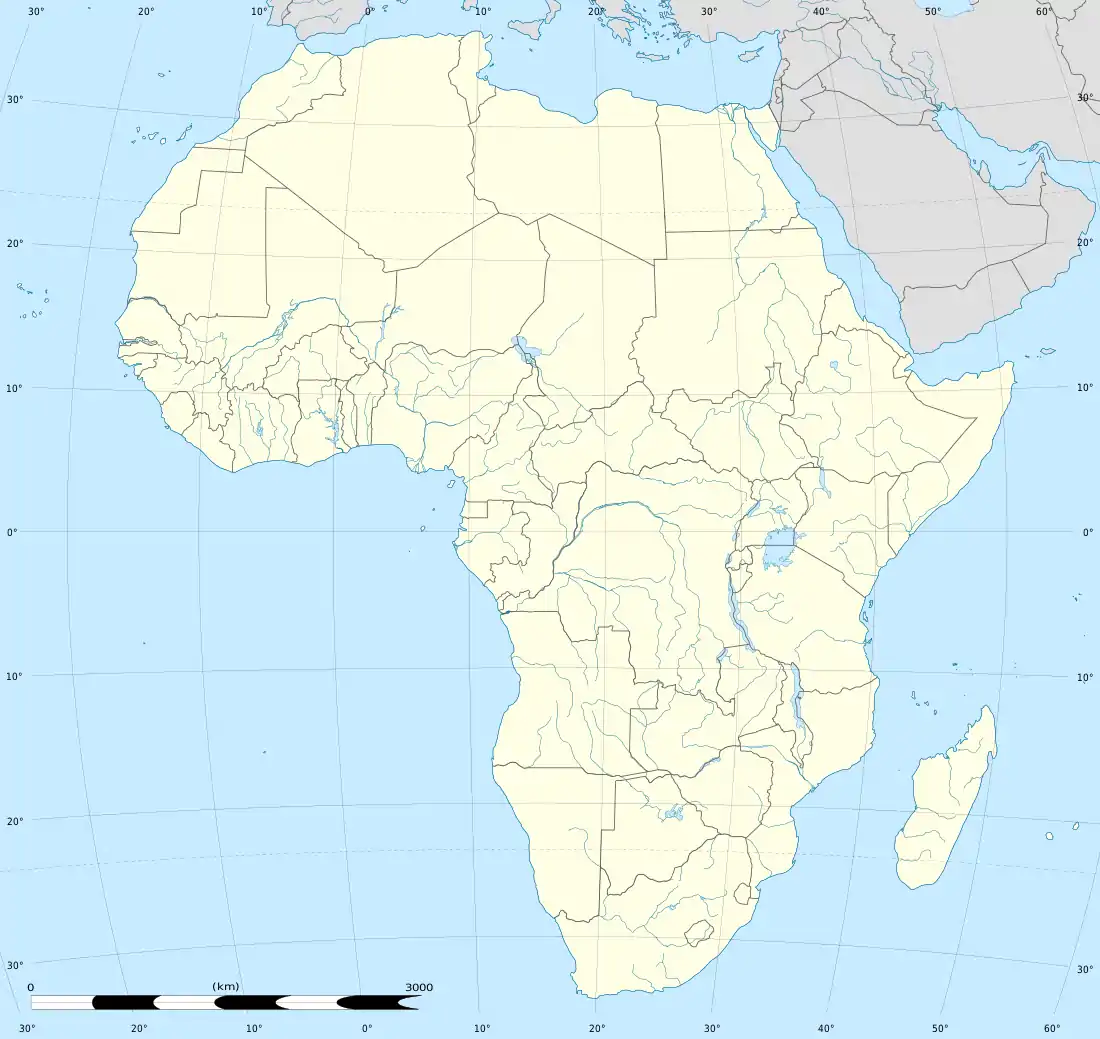LAM Mozambique Airlines Flight 470
LAM Mozambique Airlines Flight 470 was a scheduled international passenger flight from Maputo, Mozambique, to Luanda, Angola. On 29 November 2013, the Embraer E190 twinjet operating the service crashed into the Bwabwata National Park, Namibia halfway through its flight, killing all 27 passengers and 6 crew on board.[1][2]
 C9-EMC, the aircraft involved in the incident landing at Jomo Kenyatta International Airport in December 2012. | |
| Incident | |
|---|---|
| Date | 29 November 2013 |
| Summary | Suicide by pilot |
| Site | near Divundu, Bwabwata National Park, Caprivi Strip, Namibia 18°11′36″S 21°52′09″E |
| Aircraft | |
| Aircraft type | Embraer E190 |
| Aircraft name | Chaimite |
| Operator | LAM Mozambique Airlines |
| IATA flight No. | TM470 |
| ICAO flight No. | LAM470 |
| Call sign | Mozambique 470 |
| Registration | C9-EMC |
| Flight origin | Maputo International Airport, Maputo, Mozambique |
| Destination | Quatro de Fevereiro Airport, Luanda, Angola |
| Occupants | 33 |
| Passengers | 27 |
| Crew | 6 |
| Fatalities | 33 |
| Survivors | 0 |
Preliminary findings of the Mozambican Civil Aviation Institute (IACM) showed that the captain deliberately crashed the jet.[3] The Mozambican Association of Air Operators (AMOPAR) disputes the conclusion of the IACM.[4] The Directorate of Aircraft Accident Investigations Namibia agreed with the IACM that the captain inputting controls leading to the crash was the probable cause of the aviation accident.[5]:2
Crash

The aircraft had departed Maputo International Airport at 11:26 CAT (09:26 UTC), and was due to land at 14:10 WAT (13:10 UTC) at Quatro de Fevereiro Airport, Angola.
While cruising at about 38,000 feet (12,000 m) in Botswanan airspace, about halfway between Maputo and Luanda, the Embraer began to rapidly lose altitude.[2][6] The aircraft descended rapidly at a rate of about 100 feet (30 m) per second and was being tracked on radar.[6] The aircraft's track was lost from screens at 3,000 feet (910 m) above sea level, after about six minutes of losing altitude. Shortly after, the aircraft crashed into Bwabwata National Park and exploded. The explosion completely destroyed the aircraft and killed all 33 people on board instantly.[6] The last contact with air traffic control was made at 13:30 CAT (11:30 UTC) over northern Namibia during heavy rainfall.[7]
Weather was reported to be poor at the time of the incident, with heavy rainfall in the vicinity of the flight path.[1][8]
Aircraft
The aircraft involved in the incident was a one-year-old Embraer 190 with manufacturer serial number 581, registered as C9-EMC and named Chaimite. The aircraft was manufactured in October 2012 and was delivered to LAM Mozambique Airlines in November 2012. It had since accumulated more than 2900 flight hours in 1900 flight cycles.[9] It was powered by two General Electric CF34-10E engines.[10] The airframe and the engines were last inspected on 28 November 2013, one day before the crash.[2]
Passengers and crew
LAM Mozambique Airlines confirmed there were a total of 33 people on board (27 passengers and 6 crew members).[11] The Namibian Police Force Deputy Commissioner Willy Bampton stated that there were no survivors and that the aircraft was "completely burned to ashes."[12]
| Nationality | Total |
|---|---|
| Mozambique | 10 |
| Angola | 9 |
| Portugal | 5 |
| France | 1 |
| Brazil | 1 |
| China | 1 |
| Total | 27 |
The crew comprised two pilots, three cabin attendants, and a technician.[11] The captain, 49-year-old Herminio dos Santos Fernandes, had logged more than 9,000 flight hours in total (including 2,519 hours on the Embraer E190) while the first officer, 24-year-old Grácio Gregório Chimuquile, had accumulated about 1,400 hours of flying experience, with 101 of them on the Embraer E190.[2][5][13][14][15]
Response
The government of Mozambique announced it would declare a period of national mourning.[7] Portuguese President Aníbal Cavaco Silva expressed condolence to victims' families.[7] LAM Mozambique Airlines reported it was providing counselling and legal advice to families in both Mozambique and Angola and had set up an information hotline.[7]
The pattern of debris indicated that the aircraft slid along the ground for several hundred metres.[16]
Both flight recorders – the cockpit voice recorder (CVR) and the flight data recorder (FDR) – were recovered from the crash site within four days of the crash and were subsequently sent to the United States' National Transportation Safety Board (NTSB) for readout.[2][17]
Investigation
On 21 December 2013, the Mozambican Civil Aviation Institute (Instituto Moçambicano de Aviação Civil, IACM) head João Abreu presented the preliminary investigation report, according to which Captain Herminio dos Santos Fernandes had a "clear intention" to crash the jet and manually changed its autopilot settings, making this a suicide by pilot.[18] After the co-pilot left the cockpit, two minutes passed before the captain decided to lock the door, and a further minute passed before he initiated a descent.[19] NTSB pilot psychologist Malcolm Brenner stated that during this period the captain was probably "thinking about life" and contemplating whether he could carry out such an action.[19] The aircraft's intended altitude was reportedly changed three times from 38,000 feet (11,582 m) to 592 feet (180 m), the latter being below ground level, and the speed was manually adjusted as well.[20] The cockpit voice recorder captured several alarms going off during the descent, as well as repeated loud bangs on the door from the co-pilot, who was locked out of the cockpit.[2][21] Contrary to regulations by Mozambique Airlines, no cabin crew member was deployed in the cockpit during the time of the co-pilot's absence.[22]
Investigations of the aircraft's pilot revealed that Captain Fernandes had suffered a number of blows of fate prior to the accident. His son died in a suspected suicide in November 2012; Fernandes stayed away from the funeral. The one year anniversary of Fernandes' son's death occurred almost exactly on the date of the accident.[19] His daughter was also in hospital for heart surgery at the time of the crash, and his divorce proceedings were unresolved for over a decade.[22]
Despite the conclusion of the IACM, the Mozambican Association of Air Operators (AMOPAR) disputed the preliminary report, explaining that the maneuvers of Captain Fernandes were from the manual of standard operating procedures issued by Embraer (the manufacturer of the crashed aircraft) about how to "act in emergency situation to avert disaster". According to the AMOPAR document, the Mozambican Government had not complied with the standards and recommendations of the International Civil Aviation Organization (ICAO) "about the disclosure, contents and procedures relating to the preliminary report of the investigation of the crash of flight TM 470."[4]
On 15 April 2016 the DAAI released its final report finding that the inputs to the auto flight systems by the person believed to be the Captain, who remained alone on the flight deck when the person believed to be the co-pilot requested to go to the lavatory, caused the aircraft to depart from cruise flight, transition to a sustained controlled descent and subsequently crash.[5]
According to experts interviewed in the TV series Mayday, the LAM crash was not extensively covered by the media because the crash happened in a third world country. This meant that the airline industry failed to apply safety measures in time to avoid another similar incident, the crash of Germanwings Flight 9525 in the French Alps in 2015, which was found to be a deliberate act by the co-pilot.[19]
In popular culture
The accident is featured in the ninth episode of Season 20 of Mayday, also known as Air Crash Investigation. The episode is titled "Cockpit Killer".[19]
See also
References
- "Mozambique plane missing with 34 on board". BBC News. BBC. 29 November 2013. Archived from the original on 30 November 2013. Retrieved 4 December 2013.
- Hradecky, Simon. "Crash: LAM E190 over Botswana/Namibia on Nov 29th 2013, captain intentionally crashed aircraft". The Aviation Herald. Retrieved 22 December 2013.
- Sinha, Shreeya (26 March 2015). "A History of Crashes Caused by Pilots' Intentional Acts". The New York Times. ISSN 0362-4331. Retrieved 18 April 2015.
Herminio dos Santos Fernandes, the pilot of Mozambique Airlines Flight TM470 bound for Luanda, Angola, intentionally crashed the plane in a national park in Namibia on Nov. 29, 2013, according to investigators. ... When the flight's co-pilot left to use the lavatory, the captain locked him out of the cockpit and manually steered the plane downward. Listening to recovered flight recordings, investigators were able to hear alarms and banging on the cockpit door.
- Caldeira, ADérito (29 November 2014). "Mozambique: One Year After the Tragedy of Flight TM 470 Mozambique Continues Without Knowing What Really Happened". AllAfrica.com. Retrieved 18 April 2015.
- "Civil Aircraft Accident Report - ACCID/112923/1-12". Directorate of Aircraft Accident Investigations of Namibia, Ministry of Works and Transport. 15 April 2016. Retrieved 16 April 2016.
- Grobler, John (30 November 2013). "Deaths reported in air crash near Namibian-Angolan border". CNN. Retrieved 30 November 2013.
- "Missing Mozambique plane wreck found in Namibia, 33 dead". Agence France-Presse. 30 November 2013. Retrieved 30 November 2013.
- "Mozambique passenger plane missing: airline". Al Jazeera. 29 November 2013. Archived from the original on 30 November 2013.
- "Crash of an Embraer ERJ-190AR in the Bwabwata National Park: 33 killed". Bureau of Aircraft Accidents Archives. Archived from the original on 7 December 2013. Retrieved 3 December 2013.
- "C9-EMC LAM – Linhas Aéreas de Moçambique Embraer ERJ-190AR (ERJ-190-100 IGW) – cn 19000581". planespotters.net. Planespotters. Retrieved 30 November 2013.
- "About the flight TM 470 Maputo – Luanda" (Press release). LAM Mozambique Airlines. 30 November 2013. Archived from the original on 3 December 2013.
- van den Bosch, Servaas (30 November 2013). "Mozambique Airlines plane crashes in Namibia, killing 33". Reuters. Reuters. Retrieved 30 November 2013.
- "ACIDENTE AÉREO VOO TM 470: Co-piloto da LAM vai hoje a enterrar" [AIR FLIGHT ACCIDENT TM 470: LAM co-pilot goes to bury today]. Jornal Notícias (in Portuguese). 19 June 2014. Retrieved 30 April 2020.
- Caldeira, Adérito (5 December 2013). "A tragédia do voo TM 470". Verdade Online (in Portuguese). Retrieved 30 April 2020.
- "Nádia tinha força de viver" [Nádia had the strength to live]. Jornal de Notícias (in Portuguese). 6 December 2013. Retrieved 30 April 2020.
- Fosselius-Petersonhakan.strandman@vf.se, Lena (22 December 2013). "Drönare till hjälp vid katastrofer - Värmlands Folkblad" [Drone to help in disasters - Värmlands Folkblad] (in Swedish). Vf.se. Retrieved 26 February 2018.
- "NTSB Identification: DCA14RA018". ntsb.gov. National Transportation Safety Board. DCA14RA018. Retrieved 30 April 2020.
- "Pilot 'deliberately' crashed Mozambique plane". Al Jazeera. 22 December 2013. Retrieved 22 December 2013.
- "Cockpit Killer". Mayday. Season 20. Episode 9. Cineflix. 27 February 2020. Discovery Channel Canada.
- "Mozambique airline captain 'intentionally' crashed plane". The Telegraph. 22 December 2013. Retrieved 22 December 2013.
- Myburgh, Johannes (21 December 2013). "Mozambique airline captain 'intentionally' crashed: probe". Yahoo News. Agence France-Presse. Archived from the original on 24 December 2013.
- Heinrich, Dirk (15 April 2016). "Pilot steuerte in den Boden. Unfallbericht zum Absturz der Passagiermaschine Mosambiks im Bwabwata-Park" [Pilot steered into the ground. Accident report on crash of Mozambican passenger aircraft in Bwabwata National Park]. Allgemeine Zeitung (in German). p. 1. Archived from the original on 17 April 2016.
Further reading
- (in Portuguese) "IACM NA POSSE DO RELATÓRIO DA INVESTIGAÇÃO PRELIMINAR" [IACM IN POSSESSION OF THE PRELIMINARY RESEARCH REPORT] (Archive). SAPO Moçambique. 22 December 2013.
External links
| Wikinews has related news: |
- Directorate of Aircraft Accident Investigations Namibia
- LAM Mozambique Airlines – Index of press releases related to the crash
- Flight TM 470 (Archive)
- Voo TM 470 (in Portuguese) (Archive)
- Embraer
- "COMMUNIQUÉ." (Archive) 30 November 2013.
- "COMUNICADO." (Archive) 30 November 2013. (in Portuguese)
- Pre-crash photo of C9-EMC
- Accident description at the Aviation Safety Network